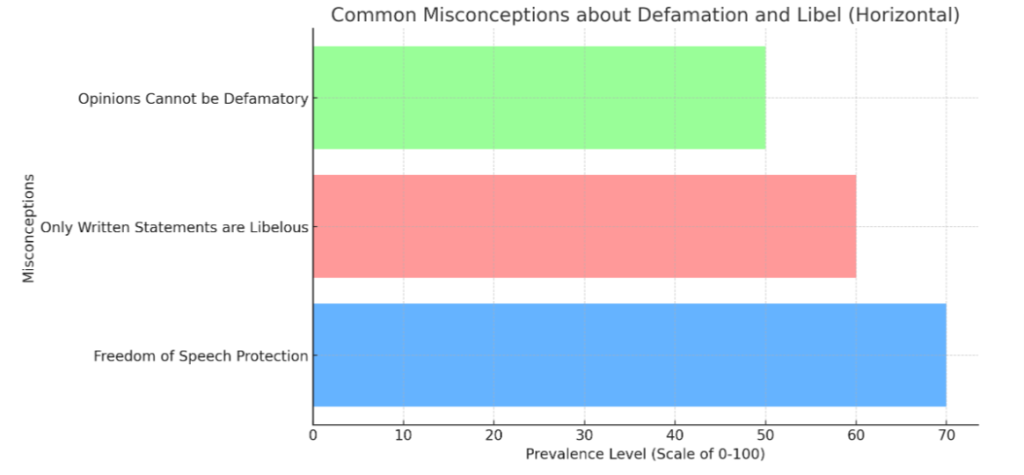Avoiding Legal Landmines: Navigating Defamation and Libel
Understanding the intricacies of defamation and libel can be quite challenging. These forms of reputation-damaging communication are more common than you might think, particularly in our digital age.
This blog post will guide you through what constitutes defamation and libel, how to prevent them, and handle potential claims effectively. Stick around as we navigate these troubled waters together!
Key Takeaways
- Defamation is the act of making false statements that harm someone’s reputation, while libel refers to written defamation and slander refers to spoken defamation.
- Defamation consists of three key elements: a false statement of fact, publication or communication of the statement to a third party, and harm to the subject’s reputation.
- To avoid defamation claims, it is important to be clear and unambiguous in your statements, ensure they are true, and consider the potential harm to someone’s reputation.
Understanding Defamation, Libel, and Slander
Defamation is the act of making false statements that harm someone’s reputation, while libel refers specifically to written defamation and slander refers to spoken defamation.
Definition of defamation
Defamation is a false statement that someone makes about another person with the intent to harm their reputation. This harmful communication can be written or spoken, and it negatively impacts the perceived image of the individual.
We call it libel when defamation takes a permanent form like writing, while slander refers to spoken harmful words. In order for something to qualify as defamation, it’s essential that the statement isn’t just damaging; it has to be untrue as well.
It’s important not only in interpersonal relationships but also professionally since one’s public image can significantly impact career opportunities and personal life choices.
Differences between libel and slander
Libel and slander both fall under the umbrella of defamation. However, they target different forms of communication. Libel refers to false statements that are written, printed or presented in another visible form which have a detrimental impact on a person’s reputation.
This includes posts on social media platforms like Facebook, Twitter, and Instagram.
On the other hand, Slander involves making harmful untruths about an individual through oral communication. It is spoken defamation and might occur during conversations or over broadcast mediums like radio or television.
Although both slander and libel can cause serious damage to a person’s image, proving libel can often lead to higher damage awards due to its more tangible nature as compared with verbal slanders.
Elements of Defamation
Defamation consists of three key elements: a false statement of fact, publication or communication of the statement to a third party, and harm to the subject’s reputation.
False statement of fact
A false statement of fact lies at the heart of defamation. These are claims about someone that are simply not true. It’s important to differentiate between opinion and facts, as opinions are considered protected speech under the law.
If you tell a lie about someone else, claiming it as fact, and this falsehood causes reputational damage, it can be classified as defamation. This type of misinformation can appear in any form – written words (libel), spoken words (slander), or even pictures.
Both private citizens and public figures can fall victim to false statements of fact potentially leading to significant personal and professional harm.
Publication
Publication refers to the act of making a statement or sharing information with others. In the context of defamation, publication is a key element that must be present for a claim to be made.
It can take various forms, including written statements, spoken words, or even online posts on social media platforms. When making any statements about someone else, it is crucial to consider the potential harm it may cause to their reputation and ensure that the information shared is true and accurate.
Being mindful of what we publish can help us avoid getting into legal trouble related to defamation and libel.
Harm to reputation
Harm to reputation is one of the key elements of a defamation claim. When someone makes false statements about another person that damage their reputation, it can lead to legal consequences.
Reputation refers to the beliefs and opinions that others have about a person based on their behavior or public image. Whether the false statements are made orally, in writing, or online, they can still cause significant harm.
It’s important to be mindful of this when expressing opinions or sharing information about others to avoid potential lawsuits and damage control efforts.
Avoiding Defamation Claims
To avoid defamation claims, it is important to be clear and unambiguous in your statements, ensuring that they cannot be misconstrued as false or defamatory.
Being clear and unambiguous
To avoid getting into trouble with defamation and libel, it’s crucial to be clear and unambiguous in your statements. This means expressing yourself clearly without leaving room for misinterpretation or confusion.
Make sure that the meaning of your words is easily understood by others so that there is no possibility of someone mischaracterizing or misconstruing what you have said. Clarity and precision are key when it comes to avoiding misunderstandings that could lead to legal consequences.
Ensuring statements are true
To avoid defamation claims, it is crucial to ensure that the statements you make are true. False statements can lead to serious consequences and harm someone’s reputation. Before making any statement about someone, always verify the facts and gather sufficient evidence to support your claim.
This applies not only to written defamation but also to oral defamation and cyber defamation on social media platforms. By being diligent in verifying the truthfulness of your statements, you can greatly reduce the risk of facing legal issues and damaging someone’s reputation.
Remember, truth is a strong defense against defamation claims.
Considering potential harm to reputation
When making statements about others, it is crucial to consider the potential harm to their reputation. Your words have the power to shape how others perceive someone, so it’s important to ensure that your statements are truthful and accurate.
Ask yourself if your statement could be seen as defamatory or damaging to someone’s character or image. Think about how your words might affect their personal and professional life.
It is always better to err on the side of caution and think twice before saying something that could cause harm or damage someone’s reputation.
Defamation Per Se and Its Consequences
Defamation per se is a serious matter with severe consequences. Learn more about the potential impact of making defamatory statements and how to avoid them in our upcoming blog post.
Definition of defamation per se
Defamation per se refers to a type of defamation where the statement is automatically considered harmful without needing any additional proof. In other words, certain false statements are so inherently damaging that they are assumed to harm someone’s reputation right away.
These types of statements typically involve serious accusations of criminal behavior, sexual misconduct, or professional incompetence. Defamation per se can have significant legal consequences, with the person who made the defamatory statement being held liable for damages without having to prove actual harm caused to the victim’s reputation.
It’s important to understand what constitutes defamation per se in order to avoid making such statements and potentially facing legal trouble.
Consequences for making a defamatory statement per se
Making a defamatory statement per se can have serious consequences. When you make false statements that are inherently damaging to someone’s reputation, you can face legal action and be held accountable for the harm caused.
Defamation per se refers to statements that are automatically considered harmful, such as accusing someone of a serious crime or claiming they have a contagious disease. In these cases, the injured party does not need to prove specific damage to their reputation.
If found guilty, you may be required to pay damages to compensate for any harm caused and possibly face additional penalties. It is important to understand the potential repercussions of making defamatory statements and strive for honesty and accuracy in all communications.

Conclusion
In conclusion, understanding the key elements of defamation and libel is crucial for steering clear of trouble. By being mindful of the statements we make, ensuring they are true and not misleading, and considering the potential harm to someone’s reputation, we can avoid falling into legal disputes.
Remember that being clear and unambiguous in our communication is essential to protect ourselves from false accusations and reputational damage.

